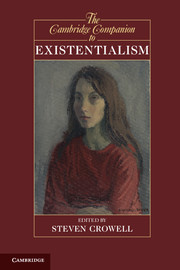Book contents
- Frontmatter
- I Introduction
- II Existentialism in Historical Perspective
- III Major Existentialist Philosophers
- 4 Kierkegaard’s single individual and the point of indirect communication
- 5 “What a monster then is man”: Pascal and Kierkegaard on being a contradictory self and what to do about it
- 6 Nietzsche: after the death of God
- 7 Nietzsche: selfhood, creativity, and philosophy
- 8 Heidegger: the existential analytic of Dasein
- 9 The antinomy of being: Heidegger’s critique of humanism
- 10 Sartre’s existentialism and the nature of consciousness
- 11 Political existentialism: the career of Sartre’s political thought
- 12 Simone de Beauvoir’s existentialism: freedom and ambiguity in the human world
- 13 Merleau-Ponty on body, flesh, and visibility
- IV The Reach of Existential Philosophy
- Bibliography
- Index
- OTHER VOLUMES IN THE SERIES OF CAMBRIDGE COMPANIONS
5 - “What a monster then is man”: Pascal and Kierkegaard on being a contradictory self and what to do about it
from III - Major Existentialist Philosophers
Published online by Cambridge University Press: 28 March 2012
- Frontmatter
- I Introduction
- II Existentialism in Historical Perspective
- III Major Existentialist Philosophers
- 4 Kierkegaard’s single individual and the point of indirect communication
- 5 “What a monster then is man”: Pascal and Kierkegaard on being a contradictory self and what to do about it
- 6 Nietzsche: after the death of God
- 7 Nietzsche: selfhood, creativity, and philosophy
- 8 Heidegger: the existential analytic of Dasein
- 9 The antinomy of being: Heidegger’s critique of humanism
- 10 Sartre’s existentialism and the nature of consciousness
- 11 Political existentialism: the career of Sartre’s political thought
- 12 Simone de Beauvoir’s existentialism: freedom and ambiguity in the human world
- 13 Merleau-Ponty on body, flesh, and visibility
- IV The Reach of Existential Philosophy
- Bibliography
- Index
- OTHER VOLUMES IN THE SERIES OF CAMBRIDGE COMPANIONS
Summary
In The Sickness unto Death, Kierkegaard summed up everything he had to say about the self in one dense description. Needless to say, the passage needs a lot of unpacking.
The human being is spirit. But what is spirit? Spirit is the self. But what is the self? The self is a relation which relates to itself, or that in the relation which is its relating to itself. The self is not the relation but the relation's relating to itself. A human being is a synthesis of the infinite and the finite, of possibility and necessity, of the eternal and the temporal. In short a synthesis. A synthesis is a relation between the two terms. Looked at in this way a human being is not yet a self.
In a relation between two things the relation is the third term in the form of a negative unity, and the two relate to the relation, and in the relation to that relation; this is what it is from the point of view of soul for soul and body to be in relation. If, on the other hand, the relation relates to itself, then this relation is the positive third, and this is the self.
Such a relation, which relates to itself, a self, must either have established itself or been established by something else.
- Type
- Chapter
- Information
- The Cambridge Companion to Existentialism , pp. 96 - 110Publisher: Cambridge University PressPrint publication year: 2012
- 4
- Cited by



